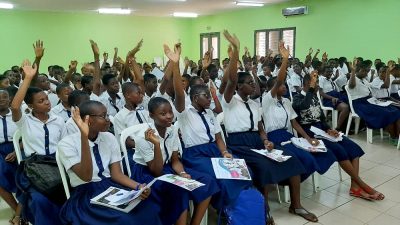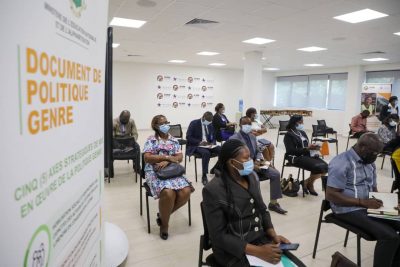
Florence Rajan, Director General of MCA Côte d'Ivoire, officially hands over the new gender policy document to Côte d’Ivoire’s Minister of National Education and Literacy, Professor Mariatou Koné.
In countries around the world, MCC has worked to increase girls’ access to quality education by supporting education policy reform, training educators, and building and rehabilitating schools and other education and training centers to create more inclusive learning environments. Countries can only thrive if women are empowered to realize their potential in every facet of their lives. Educational opportunities for girls and young women impact their ability to earn a livelihood, improve their family’s wellbeing, and participate equally with men in decision-making at home and in the public sphere.
As part of MCC’s $524.7 million compact with Côte d’Ivoire, the country has completed the development of a new Gender in Education Policy and Action Plan to promote gender equality in the education system and engage families and communities to encourage children’s participation in schools.
Tackling Gender Disparity in Education in Côte d’Ivoire
According to the Global Partnership for Education (pdf), improvements in access to basic education in Côte d’Ivoire have disproportionately benefited boys over girls. Girls are still far less likely to attend and complete primary and lower secondary school and to transition to (post)secondary education.
Young women from Côte d’Ivoire attend a briefing for the Women in Science (WiSci) camp, which will be held virtually in August 2021. MCC is one of several partners supporting the WiSci camp, the goals of which align with Côte d’Ivoire’s new Gender in Education Policy and Action Plan, which aims to boost education for girls in the country and offers special support for girls in science, technology, engineering, arts, and mathematics (STEAM).
“The gender policy document aims to precisely identify the concrete actions needed in order to move towards a fairer and more inclusive society that guarantees that girls and boys have the same access to the different cycles of education, until completion.”Florence Rajan, CEO, MCA- Côte d’Ivoire.
- Life skills for personal growth and empowerment;
- Second chance school for those who dropped out too early;
- Vocational training for building workforce skills;
- Special provisions for girls in science, technology, engineering, arts, and mathematics (STEAM); literacy; and
- Mentoring by private and public sector entities for staying in school and job opportunities.
“We are hopeful that the gender policy will provide a roadmap for bridging the gender gap in education by addressing the challenges faced by boys and girls by offering them opportunities for success. Success can be achieved through a synergy of all our actions, because only by joining our efforts, can we manage to make progress and improve the educational outcomes of all children, particularly girls, who are the first victims of inequalities, exclusion, discrimination, and abuse.
Let's try to transform gender power relations so that boys and girls can learn and develop their potential through education, a precious development value!”
Marie Véronique Bakayoko, Director of equality and gender equity in the Ministry of Education

Participants at the gender policy launch ceremony. The policy was developed in close collaboration with public and private sector partners and is designed to reach every region in the country. These partners will also helped fund the activities outlined in the action plan.

